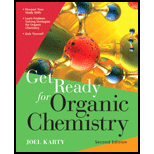
Concept explainers
Interpretation:
The mechanism for each of the hydration reactions shown in table
Concept introduction:
A nucleophilic
Want to see the full answer?
Check out a sample textbook solution
Chapter 17 Solutions
Get Ready for Organic Chemistry
- PLEASE, provide the missing reactants, reagents or products to complete the reaction.arrow_forwardComplete the following reaction by providing missing reactant or product as appropriate.arrow_forwardDraw the structure of the major organic product(s) for the following reaction between an acetylenic anion and an alkyl halide. (The reaction stoichiometry is 1:1.)arrow_forward
- Fill in the products for each of the following reactions.arrow_forwardExplain why pentane-2,4-dione forms two alkylation products (A and B) when the number ofequivalents of base is increased from one to two.arrow_forward2) Draw the complete curved arrow pushing mechanism for the following reactions. CO₂Et NaOH NH, CH3 I ✈ die 요 +arrow_forward
- Complete the following reaction by providing missing reactants or products as appropriate. (See image)arrow_forwardChoose the correct missing reagent/condition for the following reaction. To preview the image Click Here ⇓arrow_forwardDraw the pyrrole that would form in each of the following reactions. a) b) COOEt NH3 Ph cat HCI, heat NH2 cat HCI, heat c) 2 equiv NH2arrow_forward
- Predict the major product of the given hydration reaction. H3O+/H₂O draw structure ...arrow_forwardIn the following series of reactions, write which is the corresponding product or products or the reactant (s) to obtain the product.arrow_forwardWrite the reagents and reaction conditions that are necessary for each of the following transformations.arrow_forward
 Introduction to General, Organic and BiochemistryChemistryISBN:9781285869759Author:Frederick A. Bettelheim, William H. Brown, Mary K. Campbell, Shawn O. Farrell, Omar TorresPublisher:Cengage Learning
Introduction to General, Organic and BiochemistryChemistryISBN:9781285869759Author:Frederick A. Bettelheim, William H. Brown, Mary K. Campbell, Shawn O. Farrell, Omar TorresPublisher:Cengage Learning
